☆ PuniPuni Youtube ☆
PuniPuni Grammar Lesson 1: A is B – Review Notes
Today we learned the basic sentence pattern A は B です (A wa B desu), or A is B. In this review we will go over the sentences we learned in the video. We will also give additional examples of ways to use this pattern, and a list of vocabulary to get you started!
………………………………………………………………………………..
Today’s Grammar Point:
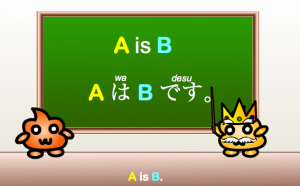
★ Today we learned the basic Japanese sentence pattern A は B です, or A is B.
★ You can use this sentence pattern to say many different things, including name, age, and occupation.
★ In addition, you can use this pattern to talk about other people or objects.
…………………………………………………………………………………
Video Example 1:
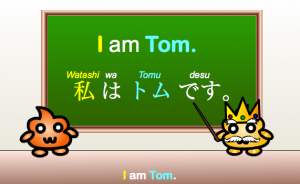
★ In the video, we learned that you can use this pattern to say your name.
★ When introducing yourself in Japanese, it is also possible to drop the first part, the topic (watashi wa), and say simply “Tom desu.” In Japanese, the topic is often dropped when it is obvious what they are talking about. You can think of it as being like someone introducing themselves in English with just a handshake, saying “Tom.”
…………………………………………………………………………………
Video Example 2:
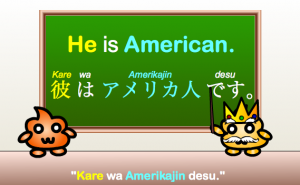
★ We also learned that you can use this pattern to identify or describe other people. This could include nationality, physical features, or anything else that you could identify or describe someone with.
…………………………………………………………………………………
Grammar Explanation:
★ In the basic sentence A は B です, A is both the topic and the subject of the sentence. A is a noun, such as a person, place, animal, or object. If you have a list of nouns, you can plug them into A to make different sentences.
★ は (wa) is grammatically what they call a “topic marking particle.” It comes right after the topic of the sentence. Although は does not literally mean “is,” it might be easier to think of it that way when you are starting out.
★ B can be a noun or an adjective. It is the thing that we are identifying A as.
★ です (desu) is called the “copula.” It is the equivalent to the English verb “to be.” This is the part of the sentence that technically means “is” or “am.” It also carries a level of politeness or formality with it.
………………………………………………………………………………..
Telling your age:
You can use this same structure to tell your age. All you need are the words for “I” (watashi) and your age (listed below). Plug these into the formula and you can say your age!
私は15さいです。
Watashi wa jūgosai desu.
I am 15 years old.
Age list:
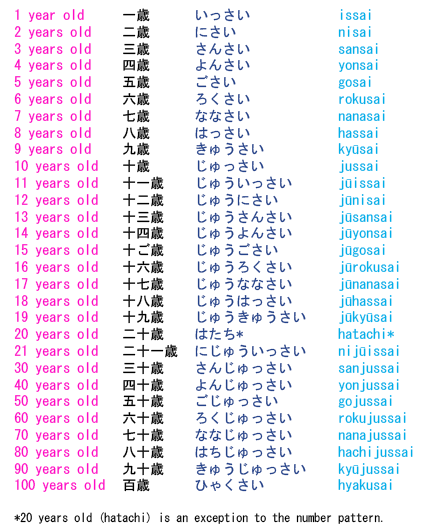
………………………………………………………………………………..
Telling your occupation:
You can also tell your occupation using the pattern A は B です, or A is B. For example,
私は学生です。
watashi wa gakusei desu.
I am a student.
Vocabulary list:
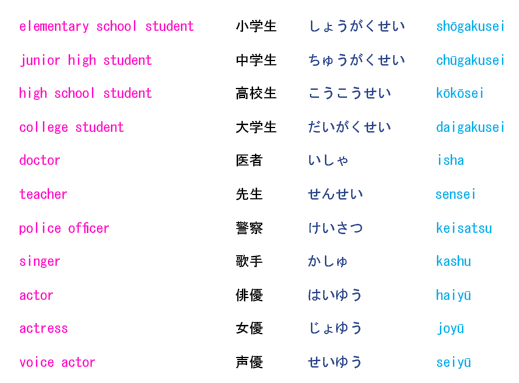
………………………………………………………………………………..
Talking about other people or things:
You can use this same pattern to talk about other people or things. The following nouns are some of the words that could be used in place of A.
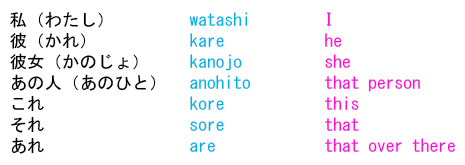
Example 1:
彼は大学生です。
Kare wa daigakusei desu.
He is a college student.
Example 2:
これはペンです。
Kore wa pen desu.
This is a pen.
………………………………………………………………………………..
Conclusion:
Today we learned that we can make a lot of different sentences by using the pattern A は B です, or A is B. Some of the things we learned to say using this pattern include, how to say our age, our occupation, and our name, and how to talk about other people or things.
Although the lists here are incomplete, it should be enough to get you to started building your own Japanese sentences! If you have any grammar questions, or you want to know how to say something using this pattern that wasn’t listed, feel free to leave a comment below!
………………………………………………………………………………..
Do you want to study JLPT?
If you are interested in JLPT N5ーN3 preparation course (community), Click here!
………………………………………………………………………………..
Do you want a Japanese tutor?
Take Japanese Skype Lessons with Professional Japanese Teachers on kakehashijapan.com!
………………………………………………………………………………..
………………………………………………………………………………..
Do you want a Japanese tutor?
Take Japanese Skype Lessons with Professional Japanese Teachers on kakehashijapan.com!
………………………………………………………………………………..
………………………………………………………………………………..








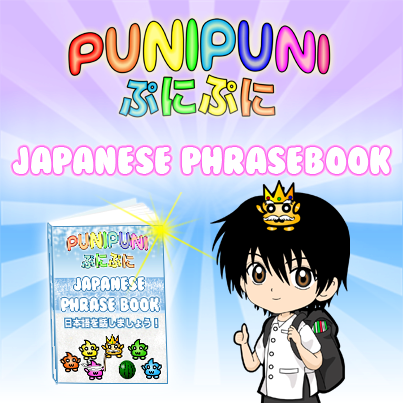

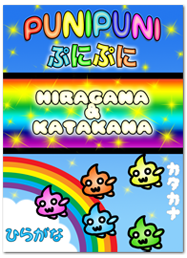
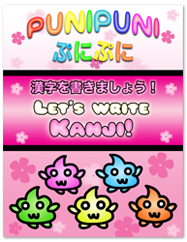


40 comments
Thank you so much, i can learn a lot of japanese language ! Please keep going !
Comment by Sou on 09/04/2012 at 12:02 pmありがとう〜☆これからもよろしくおねがいします(◕ω◕)♪ We will do our best!!
Comment by PuniPuni on 09/17/2012 at 11:11 amThis technique is so much easier to understand. Thanks PuniPuni! 🙂
Comment by Esha on 10/11/2012 at 9:43 pmEshaちゃん, どういたしまして!\(◕ω◕)/♥ You’re welcome!
Comment by PuniPuni on 10/13/2012 at 10:08 amThe other day I was watching Sgt. Frog and noticed one of the lyrics said “keron wa uchuu ichi, tabun” translated ” keron is number one in the world I think”. [well it was something like that] Why was desu not used? it is an A [keron] is B [number one in the world i think] sentence. right?
Comment by Morgan on 10/12/2012 at 10:26 pmThis is a good example of casual speech! Unlike formal speech, casual speech does not use the word “desu.” Songs are often sung in casual Japanese rather than formal Japanese. Most people start to learn formal Japanese before they learn casual Japanese because once you learn formal Japanese it is much easier to learn casual Japanese. It is great that you are really listening to the lyrics and trying to figure out what they are saying! Good job!! \(◕ω◕)/☆
Comment by PuniPuni on 10/13/2012 at 10:02 amWatashi wa Pratiwi Amie Pisesha, 5years later (i should used ‘kongo 5-nenkan’ or ‘5-nen go’) watashi wa nogyo no konsarutanto ni naritai. 3kagetsu-go wa shiyo kikan. wish me good luck ok? pfiuh my noodles is overcooked because i try to write this in japanese.
Comment by Pratiwi A. P. on 10/21/2012 at 8:09 am5 years later=5-nen go
Sugoi! Ganbatte ne! \(>ω<)/♥
Comment by PuniPuni on 10/21/2012 at 11:14 amI was just wondering what the character after
Comment by Reese on 01/21/2013 at 7:52 pm一 ニ 三 四 ect… in the age list was. I couldn’t read it too well >.<
Thank you for reading this! ^w^
歳 (さい-sai) is the counter for age (◕ω◕)♪
Comment by PuniPuni on 01/21/2013 at 8:13 pmIn Animes in some japanese songs they sometimes use “boku” instead of “watashi” for “I”. According to a japanese grammar book, “boku” is used by men and boys but I believe that in some cases in songs or film I also heard girls say/sing “boku”. So what’s the difference between “watashi” an “boku” excactly?
Comment by Ahoy Hoy on 02/16/2013 at 10:14 amThey are the same (◕ω◕)♪ There are many ways to say “I” in Japanese☆
The three most common ways are “watashi”, “boku”, and “ore”. “Boku” and “ore” are generally used only by men and boys (except sometimes in songs or in anime). “Watashi” can be used by both genders♪
There is also a difference in the level of politeness. Out of these three, “Watashi” is the most formal and “ore” is the most casual☆
Comment by PuniPuni on 02/16/2013 at 1:05 pmKonnichiwa! I want to say : . Kore wa Nana Osaki desu. That`s right?
Comment by Alina on 02/17/2013 at 11:07 amKonnichiwa (◕ω◕)♪ We don’t use the word “kore” for people, only for objects. If you want to say “this is Nana Osaki”, you can just say “Osaki Nana desu.” (Japanese last names come first)
Comment by PuniPuni on 02/17/2013 at 11:15 amWant to say This is Nana Osaki.
Comment by Alina on 02/17/2013 at 11:09 amreally it is nice for bignners
Comment by abel on 03/09/2013 at 3:04 pmthis is great! just bought the kana blaster game cause i really need to brush up on both my hiragana and katakana, i only know a little bit of them! games and videos make it so much easier to learn for me since i have some attention problems, thank you so much for this site!
Comment by Leena on 04/06/2013 at 1:59 amYou’re welcome! \(◕ω◕)/♥ We are happy to hear that! If you have any questions, feel free to ask us any time☆ Good luck with your Japanese studies♪ 日本語の勉強がんばってね!
Comment by PuniPuni on 04/06/2013 at 9:22 ami will learn it. i will try my best. thanks a lot
Comment by hani on 04/09/2013 at 10:04 amArigatou gozaimashita:D this website helps me a lot with my Japanese, it’s simple, and easier to learn:3 so thankyou punipuni sensei 😀
Comment by Natalie on 05/28/2013 at 5:12 amHow do you say like?
Comment by じえ-ど (Jade) on 10/08/2013 at 3:24 pmFor example if you want to say I like apples would
You say watashi (like here) ringo desu.
????
You would say 私はりんごが好きです。(watashi wa ringo ga suki desu). (◕ω◕)☆ Please check out our other grammar lesson to learn how to say likes and dislikes in Japanese! http://www.punipunijapan.com/suki-kirai/
Comment by PuniPuni on 10/10/2013 at 8:07 amCan you use わ instead of the combo hirigana?
Comment by じえ-ど (Jade) on 10/09/2013 at 12:38 pmI have a kana keyboard on my phone and whenever I write wa after
Watashi, wa comes out like わ。
For the particle wa, you must use the hiragana は (please type ‘ha’ on your keyboard). If you use わ for the particle wa, it is incorrect. However, you should use it when it is part of a word that has the sound wa in it. For example, わたし (watashi). (◕ω◕)♥
Comment by PuniPuni on 10/10/2013 at 8:05 amIsn’t は pronounced as “ha” not “wa”
“PuniPuni Grammar Lesson 1: A is B – Review Notes
Today we learned the basic sentence pattern A は B です (A wa B desu), or A is B. In this review we will go over the sentences we learned in the video. We will also give additional examples of ways to use this pattern, and a list of vocabulary to get you started!”
Confusing for me coz “wa” is in another character in my book.. pls help.. Iam a noob. 🙂
Comment by ralph on 12/01/2013 at 8:06 amDon’t worry! Everyone has this question when they are just starting out. The answer is: は is pronounced as “ha” EXCEPT when it is used as a particle (not as part of a word). When it is used as a particle, it is pronounced “wa.” There is another character that is also pronounced “wa” (わ) but this is not used for the particle “wa.”
For example, check out this sentence: わたしははなです。(watashi wa hana desu. – “I am Hana.”) In this sentence, the first word わたし (watashi) starts with the normal hiragana for “wa.” Next comes the particle は which is written like “ha” but it pronounced “wa.” After the particle comes a person’s name はな (hana), this time は is being pronounced as “ha” because it is a part of a word, not a particle.
Basically, when は is used as a particle, it is pronounced “wa.” Otherwise, it is pronounced “ha.” Hope that helps (>ω<)☆
Comment by PuniPuni on 12/02/2013 at 4:24 amWhat is the difference between sensei and isha? I have heard doctors called ‘sensei’ before, so I have that doubt ‘0’
Is it that the profession is called isha, but when addressing them, they are called sensei?
Comment by Beatriz on 12/06/2013 at 3:33 pmSensei is used as a title of respect for doctors, teachers, and other professionals. It is used both when addressing them directly and when referring to them to other people. Isha is just used as a profession, so like if you wanted to say “I am a doctor” or “I need a doctor.” But if you wanted to say “Dr. Phil” for example, you would say “Phil Sensei.” (◕ω◕)☆
Comment by PuniPuni on 12/11/2013 at 7:59 amHello!
Comment by jessa on 01/29/2014 at 9:38 pmWe use “kare” meaning “he” for third person.
but if the speaker is male we use “boku” for
1st person.
Is it correct?
thanks a lot 🙂
Yes, for first person (“I”) you can use “boku” or “ore” or “watashi” if you are male. If you are female, you should use “watashi.”
Comment by PuniPuni on 01/31/2014 at 7:33 pm“Kare” means “him” and “kanojo” means “her.” (◕ω<)♪
Thank you so much, plz keep going don’t stopp such amazing lessons. 🙂 ^__^
Comment by Shbi on 02/07/2014 at 12:38 amWaaa .. Arigatou 🙂 it really helped.
Comment by Misaki on 03/22/2014 at 3:27 amwatashi wa heritz desu. watashi wa Mareeshia-jin desu. hajimemashite, yoroshiku onigaishimasu. i am motivated to learn Japanese due to my interest of anime, manga and visual novels. i’ve learned the basic simple sentence structure but always got confused when so many different particles are put together in one sentence. that is when i came across this website. thank you so much punipuni sensei for this great website. thanks for replying all the question in the comments section as well. i learn something new every time. domo arigato gozaimasu.
Comment by heritz on 03/31/2014 at 4:18 pmdoumo arigato gozaimasu!
Comment by kiruthick on 04/13/2014 at 3:44 amKonnichiwa, Punipunijapan!! 😀 I want to THANK those people behind this website :), you’re posts and teachings are very useful and easy to understand. I LOVE JAPAN, the people in it, its language, its culture and everything so I will do my best to learn Japanese so I can reach every Japanese people and express my love for Japan :)Arigatou!!
Comment by Shy on 05/09/2014 at 12:11 amKonnnichiwa! You are very welcome! We are glad that you are enjoying our website! We hope that it will help you to grow and learn Japanese! Keep doing your best! 日本語の勉強をがんばってね! (◕ω<)b♡
Comment by PuniPuni on 05/09/2014 at 8:36 amSo,in example 2 I could just say “Pen desu” to say this is a pen? Thanks in advance!
Comment by Christen Duerring on 12/22/2014 at 4:56 pmYes, you can!
Comment by PuniPuni on 01/06/2015 at 7:18 amHow do you tell ha and wa apart? They have the same kanji/hiragana symbol (は) and I’m having trouble deciding whether it’s ha or wa in sentences.
Comment by Tori on 12/31/2014 at 6:38 pmThe only time you pronounce は as “wa” is when it is being used as a particle in the sentence. In other words, you must look at the surrounding words to decide whether the は is being used as a particle or not. If it is being used as part of a word, like はな (hana) then it would be pronounced as “ha.” Once you start to learn more Japanese, you will be able to tell much more easily what part of speech it is, and therefore which pronunciation to use.
Comment by PuniPuni on 01/06/2015 at 7:15 am